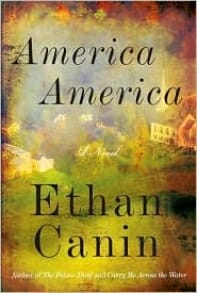Ethan Canin

Canin and the promised land
“How did this person’s life turn out the way it did?”
This is the question that interests Ethan Canin as a writer. In fact, he once said in an interview that it was the only question that interested him, which is why he stopped writing short fiction—there simply wasn’t enough space in which to give a full answer.
Many of his best ‘life stories’ depict the coming of age of fundamentally decent young men: William Messerman of “Batorsag and Szerelem” (The Palace Thief); August Kleinman (Carry Me Across the Water); Orno Tarcher (For Kings and Planets); and now, Corey Sifter (America America). This time, however, Canin isn’t just asking how a man’s life turned out the way it did; he’s applying the same question to our country. It is America itself that comes of age in this haunting and elegiac fourth novel, and the transition is a sorrowful one.
Nixon is in his first term and Vietnam is tearing the nation apart when Corey—the bright, earnest son of working- class parents—accepts a job as a hand at Aberdeen West, the grand estate of the Metarey family. Industrialists and philanthropists in the Carnegie mold, they own the small town of Saline, N.Y., and everything in it. The Metareys are benevolent rulers, revered by the townspeople who work in their lumber mills, limestone quarries and factories. As Corey, narrating from the vantage point of middle age, says:
It might seem quaint today that a whole town thought of these men the way we did then—as benefactors and guardians, and even, if needed, as saviors. But that was what the town of Saline was like when I was growing up. My eyes are clearer now … but I still believe that Liam Metarey was a generous, civic-minded, and altruistic patron of the whole community.
Class and its obligations are at the heart of America America. So, too, is the corrupt- ing nature of power.
-

-

-

-

-

-

-

-

-

-

-

-

-

-

-

-

-

-

-

-

-

-

-

-

-

-

-

-

-

-

-

-

-

-

-

-

-

-

-

-








































